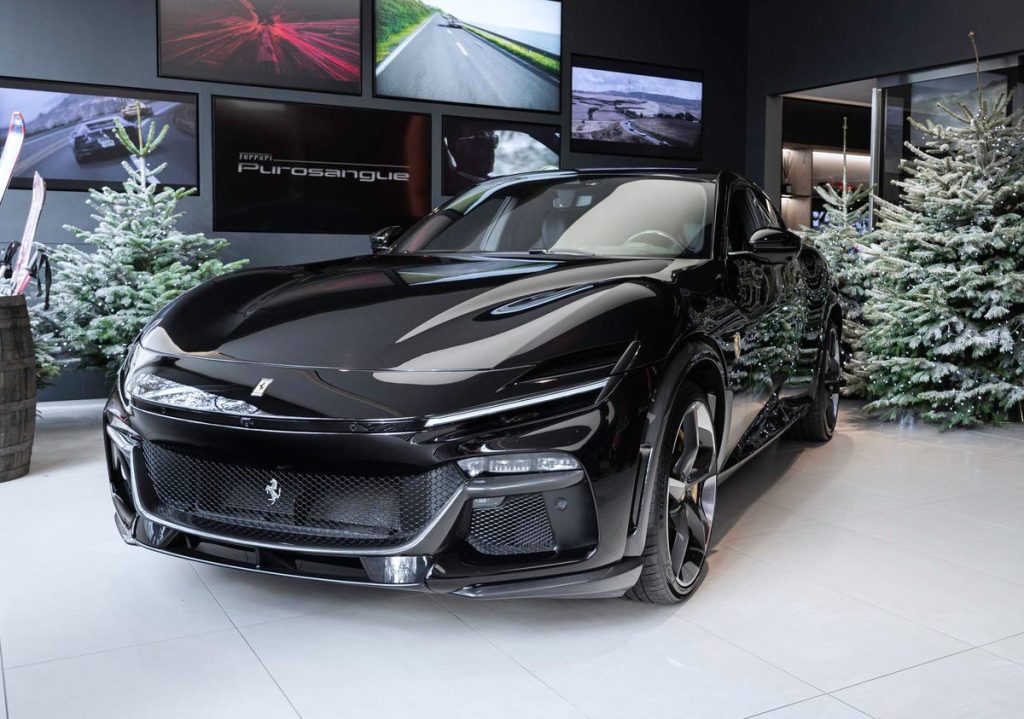Ferrari, purveyor of exotic sports-cars to the super-rich, keeps on surprising investors by outperforming profit estimates and as the new Purosangue SUV goes on sale, the company’s stock price has been barreling ahead.
Since a low of about €160 last July, the shares have accelerated by nearly 70% to close Friday at €272.4.
Calling the Purosangue an SUV will surprise drivers of mud-plugging, desert crossing, river-fording Toyota Land Cruisers or Range Rovers. But it certainly rides higher than the traditional Ferrari two-door sports cars, seats 4 allegedly, and will compete with luxury SUVs like the Rolls Royce Cullinan, Lamborghini Urus, Bentley Bentayga, and Aston Martin DBX. New owners of the Purosangue (thoroughbred in Italian) are unlikely to try any off-road trips, not least because a Ferrari in the wild won’t turn many heads, surely the main selling point, and the V-12 scream would frighten the animals. Deliveries of the €390,000 ($427,000) Purosangue are scheduled to start in the current quarter.
In the first quarter, Ferrari reported adjusted earnings before interest, tax, depreciation and amortisation (EBITDA) rose 27% to €537 million ($587 million) compared with the same period of 2022. This was a much faster pace than analysts had expected. Revenues were €1.43 billion ($1.56 billion). Ferrari expects a strong current quarter followed by a soft 2nd half of the year.
The company is preparing to shift to electric vehicles. The first one is promised for 2025, and they will dominate Ferrari’s portfolio with plug-in hybrid electric vehicles in the 2nd half of the decade.
Investment researcher Jefferies said most of Ferrari’s recent sales growth came from a mix of market growth and weakening of the competition led by Aston Martin and McLaren.
“SUVs (sport utility vehicles) and SAVs (sports activity vehicles) are the new GT road cars and Purosangue is only scratching the surface with a more extensive range of activity vehicles likely over time. Ferrari “broke policy” with an order book extending beyond 24 months into 2025 and taking Purosangue orders for delivery in 2026,” Jefferies said in a report.
Ferrari CEO Benedetto Vigna told an analyst’s meeting despite extending the ordering period the Purosangue would never account for more than 20% of overall sales to retain a degree of exclusivity.
Jefferies wondered if Ferrari’s interest in embracing so-called e-fuels made sense, even though most of its vehicles are not driven long distances and wouldn’t hurt the drive to net zero.
CEO Vigna had said using e-fuels would not conflict with Ferrari’s aim to become carbon neutral by 2030. E-fuels are made by synthesizing captured CO2 and hydrogen using renewable CO2-free electricity.
“Pursuing commercial e-fuels longer term does not look to us like the right allocation of still insufficient renewable energy sources or even a scalable solution, from carbon capture to manufacturing, transport and distribution, compared to other de-carbonation strategies or Ferrari assuming technology leadership,” Jefferies said.
Jefferies predicted Ferrari sales would rise 1% to 14,100 in 2023, while gross margin would rise one percentage point to 52.5%.
Bernstein Research reckoned the share price growth showed investors expect more good news.
“(Ferrari) sits on an extremely strong product mix, has delivered proven pricing power this quarter, and its lengthy order book and potentially even lengthier wait list insulates against any recession-driven order cancellations,” Bernstein Research said.
Investment bank UBS said it was impressed by two factors in Ferrari’s performance. Firstly, the degree of personalization which added to profits, and the contribution of the Daytona models, which sell for about €2 million ($2.2 million).
“Management indicated it expects to deliver 30 to 40 of the €2 million Daytonas per quarter. While this is below expectations – we were modelling 50 to 60 – it actually implies that 2024 will see a higher weight of Daytonas, thus leading to better price mix,” UBS said in a report.
Read the full article here
